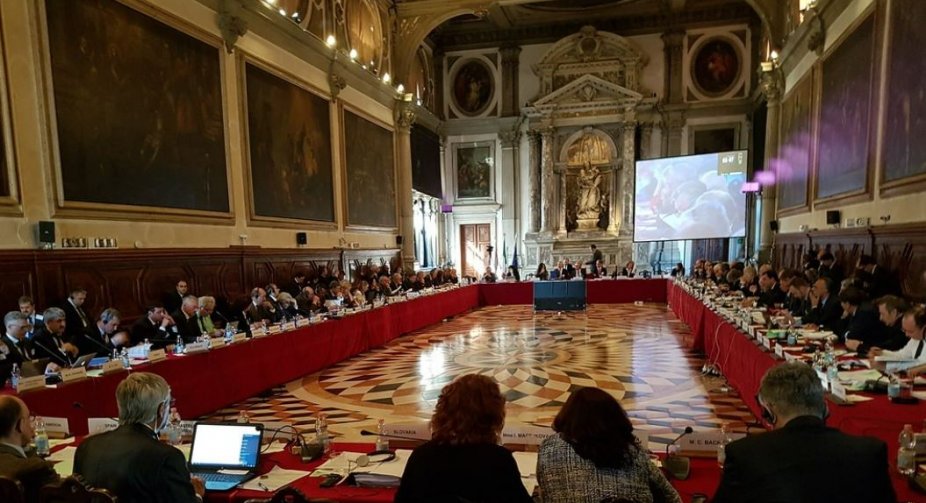Paata Manjgaladze, an MP of Strategy Agmashenebeli opposition party, on Wednesday criticized the ruling Georgian Dream party following the Venice Commission's critical assessment of the controversial Foreign Influence bill.
Manjgaladze characterized the statements from the ruling power as "complete madness" and suggested they merit ridicule unless considered an act of treason.
Manjgaladze argued that the authorities were rejecting the US, the European Union, and the broader civilized world over a "scrap of paper" - the "Russian law." He claimed that Georgian Dream was dismissing the collective opinions of international bodies like NATO, the United Nations, the European Council, the European Parliament, the European Commission, and Western nations such as America and Great Britain, which he believed were all united against the proposed law.
"The Venice Commission stated that the Foreign Influence Transparency bill is essentially a 'Russian passport' that will prevent our entry into the European Union. What more Russian work should you do? Because of this 'Russian law,' you are saying 'no' to the US and the EU, and declaring an information war on the entire civilized world. What should be done about this obvious Russian initiative? If Western influence decreases in Georgia, whose influence will increase? I urge Georgian Dream and its propagandists: what are you signing that threatens Georgia's existence as a free state?" Manjgaladze said.
He further accused Bidzina Ivanishvili, the founder and the honorary chair of the GD, of wanting to impose a "rusty Russian curtain" over Georgia, jeopardizing the country's well-being and future prospects.
The Venice Commission has issued an urgent opinion recommending the recall of the Foreign Influence Transparency bill in its current form. The Commission's conclusion indicated that the draft law would ultimately harm open, informed public debate, pluralism, and democracy.
In response, the GD dismissed the Commission's conclusion as being politically charged, lacking legal and professional justification, and containing factual inaccuracies. Tina Bokuchava, chairwoman of the United National Movement opposition faction, condemned this response, accusing “Ivanishvili's Russian government" of attacking the Venice Commission and questioning its competence.
"The Venice Commission is an independent body of the Council of Europe in constitutional and legal matters. It is the highest-ranking European legal evaluation body, whose recommendations the European Commission considers in its decisions to grant candidate status to Georgia. Ignoring these recommendations sabotages our European future," Bokuchava stated.
Levan Khabeishvili, chairman of the UNM, echoed these sentiments, describing the GD as being opposed to the country's development. He warned that implementing this law would align Georgia more closely with North Korea rather than Europe.
In a critical opinion issued on Tuesday, the Council of Europe’s Venice Commission has strongly advised the repeal of Georgia's Law on Transparency of Foreign Influence in its current form. The Commission warned that the law posed “severe threats” to freedoms of association and expression, privacy rights, participation in public affairs, and the principle of non-discrimination.
The bill, which had passed through all three readings in Parliament before being vetoed, is now under reconsideration by the legislative body. With the parliamentary majority wielding over 80 votes, the support of 76 deputies is sufficient to override the veto.
Per protocol, Parliament will initially vote on the president's motivated remarks. Should they be dismissed, a subsequent vote on the bill passed in three readings, requiring at least 76 supporters, will determine whether the veto is overridden.
The constitution does not stipulate a timeframe for Parliament to decide on overriding or accepting a veto once it's been issued. Despite widespread protests in Georgia against the bill and significant criticism from partner states urging its rejection, the ruling majority of Georgian Dream passed the "Bill on Transparency of Foreign Influence" in its third reading on March 14, securing 84 votes.
The bill designates non-governmental and media organizations whose income exceeds 20 percent from abroad as entities serving the interests of a foreign power. They are required to register in a specialized registry and submit financial declarations annually, with failure resulting in a 25, 000 GEL fine upon first offense.






